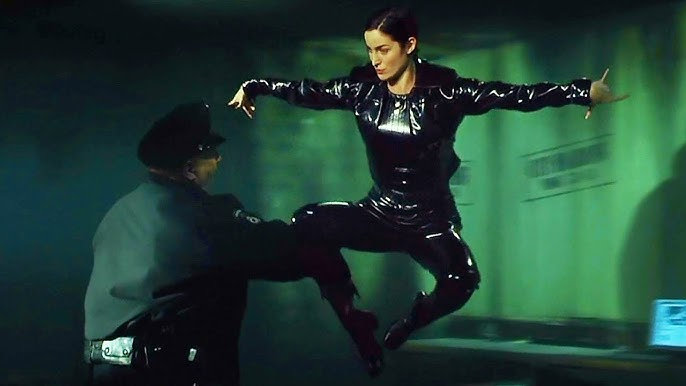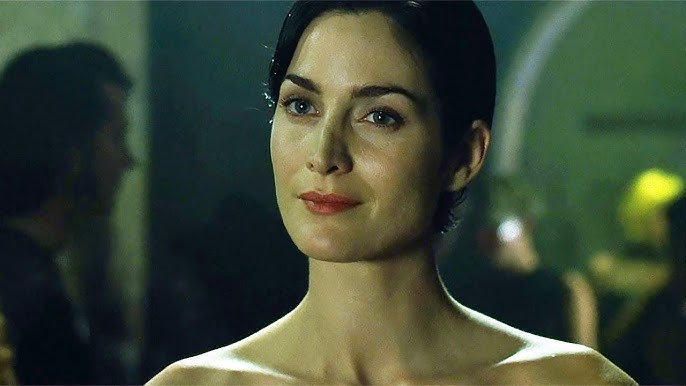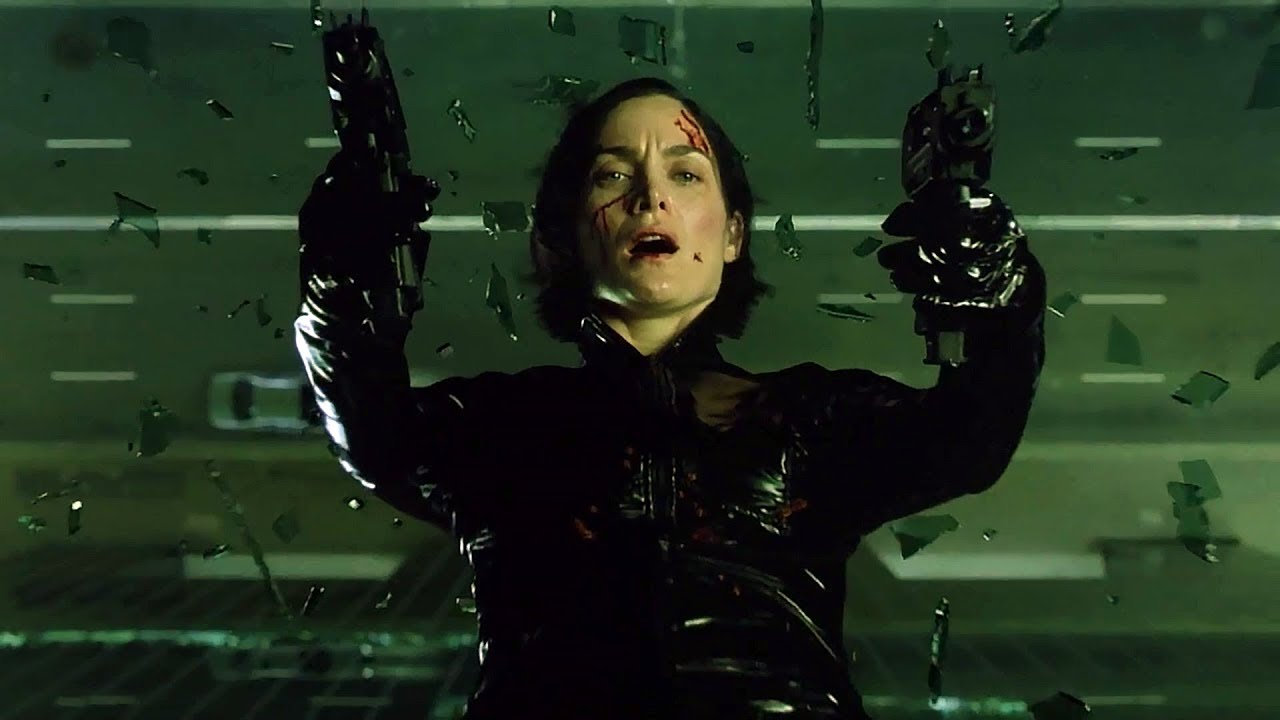The Matrix didn't just revolutionize cinema with its groundbreaking visual effects and philosophical depth. It gave us Trinity, a character who redefined what it means to be a strong woman in action cinema. While Hollywood has struggled for decades to create authentic female characters who are both powerful and believable, Trinity emerged as a near-perfect example of how to do it right. She wasn't just Neo's love interest or a token female warrior. She was an essential pillar of the story, a character whose strength came not from merely mimicking masculine traits, but from a perfect balance of power and vulnerability, independence and connection.
The Hacker Who Cracked More Than Code
When we first meet Trinity, she's already a legend. She's the hacker who broke into the IRS database, a feat that earned her legendary status in the underground digital world. But that's just the surface. As Nebuchadnezzar's second captain, Trinity represents something far more significant than her technical skills. She embodies the rare combination of intellectual brilliance, physical prowess, and emotional depth that makes truly memorable characters.
The opening sequence of The Matrix tells us everything we need to know about Trinity before a single word of exposition is spoken. Surrounded by police in room 303, she doesn't panic. She doesn't need rescuing. Instead, she becomes the predator, moving with such lethal grace that Agent Smith warns the police lieutenant that his men are already dead. This isn't an exaggeration or bravado. It's a statement of fact. Trinity is that dangerous, that skilled, that exceptional.

What makes this introduction brilliant is that it subverts our expectations without feeling forced or political. The movie doesn't stop to congratulate itself for having a capable female character. It simply shows us who Trinity is through action, allowing her competence to speak for itself. This is the fundamental difference between authentic character writing and the hollow attempts at "strong female characters" that often feel more like checking boxes than creating real people.
The Meaning Behind the Name
Trinity isn't just a cool-sounding name. It carries layers of meaning that connect to the film's deeper religious and philosophical themes. In Christian theology, the Trinity represents the Father, the Son, and the Holy Spirit, three distinct persons united in one divine essence. Within the Matrix mythology, this trinity is reflected in the relationship between Morpheus (the father figure), Neo (the son, the chosen one), and Trinity (the holy spirit).
This religious symbolism isn't accidental or superficial. When Neo first meets Trinity and discovers her identity, his reaction is telling. "Trinity? The Trinity? I thought you were a man." Her response cuts through centuries of assumption: "Most men do." This simple exchange carries profound weight. It challenges the default assumption that exceptional achievement belongs to men, that god-like power must be masculine. Trinity, as the embodiment of the holy spirit in this modern mythology, breaks that mold entirely.
The holy spirit has always been the most mysterious, the most ethereal element of the Christian trinity. Similarly, Trinity in The Matrix operates as the unseen force that makes everything possible. She's the one who finds Neo. She's the one who brings him back from death. She's the catalyst for prophecy to become reality. Without Trinity, there is no chosen one. Without her love, Neo remains just another dead hacker in a pod.
Character vs. Type: What Makes Trinity Work
To understand why Trinity succeeds where so many similar characters fail, we need to understand the difference between a character and a type. A type is a template, a collection of familiar traits and behaviors that fit a recognizable pattern. Types don't change or grow. They're static, predictable, comfortable in their familiarity. Think of stock characters in countless films: the tough guy, the nerdy sidekick, the femme fatale.
A character, by contrast, is unique. A character has depth, contradictions, growth. A character makes choices that feel genuine to who they are, not what the plot requires. Trinity is a character, not a type, and that distinction makes all the difference.
She's not just "the tough girl." She has vulnerabilities. She experiences fear, doubt, and love. When she tells herself "Get up, Trinity, just get up" after a brutal fall while escaping agents, we see both her physical limits and her iron will. She's hurt, exhausted, potentially outmatched, but she refuses to quit. This moment reveals more about her character than a dozen action scenes could. It shows us that her strength isn't superhuman invulnerability. It's the choice to keep fighting even when everything hurts.
This is crucial. Many modern attempts at "strong female characters" make them essentially invincible, removing any sense of stakes or struggle. They never fail, never doubt, never show weakness. This doesn't make them strong. It makes them boring and unrelatable. Trinity's strength is magnified by the moments when we see her struggle, when we understand that her victories are hard-won, not inevitable.
The Feminine and the Warrior
One of Trinity's most remarkable qualities is how she integrates traditionally feminine traits with her warrior capabilities. She's not strong despite being a woman. She's not strong by abandoning femininity. She's strong in a way that feels distinctly her own.
Consider the scene after Neo's first encounter with agents, when he's exhausted and traumatized. Trinity brings him food, showing a nurturing, caring side. This isn't weakness. This is another facet of her strength. She understands that taking care of her crew matters. She knows that survival isn't just about fighting. It's about maintaining humanity, connection, and compassion in a world designed to strip those things away.
When Neo is in danger, Trinity's protective instincts kick in with fierce intensity. She risks everything to save him, multiple times, not because she's weak or codependent, but because she values the people she cares about more than her own safety. This willingness to sacrifice, to put others first, is portrayed as strength, not foolishness. It's what separates the humans from the machines.
The balance Trinity strikes is incredibly difficult to achieve in fiction. Make a female character too nurturing and she becomes a stereotype. Make her too aggressive and she feels like a man in a woman's body. Trinity exists in the space between these extremes, feeling fully human, fully herself, and fully capable.
The Trinity Syndrome
Interestingly, Trinity's character arc also illustrates a common problem in action narratives, a problem so prevalent that it's actually named after her: the Trinity Syndrome. This refers to female characters who start incredibly competent but gradually become less capable as the story progresses, often in service of elevating the male protagonist.
In the first Matrix film, Trinity is clearly more experienced and skilled than Neo. She's been free longer. She knows the Matrix better. She can do things Neo can't. But as the story unfolds and Neo grows into his role as The One, Trinity's role shifts. She becomes more reactive, more in need of rescue, more defined by her relationship to Neo than by her own capabilities.
This isn't entirely a flaw. The story requires Neo to ascend to power beyond anyone else's. The narrative is, after all, about the chosen one, not about Trinity. But it does reflect a broader pattern in Hollywood storytelling where female characters are allowed to be impressive only until they threaten to overshadow the male hero. Then they must step back, diminish, or be sidelined.
What saves Trinity from being just another victim of this syndrome is the depth already established in her character. Even as her role changes, her essential nature remains. We never forget who she is or what she's capable of. And crucially, the story acknowledges that Neo's power comes partly from Trinity's love, from her belief in him. She's not weakened by loving him. Her love is what makes the prophecy possible. She's not a passive prize to be won. She's an active force that shapes reality.
Key Moments That Define Trinity
Certain scenes crystallize who Trinity is better than any amount of description could. The phone booth chase in the opening, where she moves with impossible speed and grace, establishes her as someone extraordinary. The rooftop leap into a tiny window demonstrates not just physical ability but absolute fearlessness and precision.
But it's the quieter moments that reveal her depth. When Neo is about to leave the car on the Adam Street Bridge, ready to walk away from everything, Trinity stops him. "Please, Neo. You have to trust me," she says. "Because you've been down there. You know that road. You know exactly where it ends. And I know that's not where you want to be."
This isn't manipulation. It's truth spoken with compassion. Trinity sees Neo's potential and his pain. She understands what it means to live asleep in the Matrix, to sense that something is wrong but not know what. She's offering him a chance at something real, even though it's dangerous and difficult. The way she speaks to him in this moment, with urgency but also gentleness, shows the full dimension of her character.
Later, when Neo decides to rescue Morpheus from the agents, Trinity doesn't try to stop him or protect him from his choices. She challenges him, tests his commitment. When he suggests she shouldn't come, her response is perfect: "Let me tell you what I believe. I believe that Morpheus means more to me than he does to you. I believe if you were really serious about rescuing him, you would need my help. And I believe you're the highest ranking officer on this ship. If you don't like it, I believe you can go to hell. Because you're not going anywhere else."
This speech is Trinity at her finest. She's assertive without being aggressive. She's stating facts, not asking permission. She's committed to the mission and to Neo, but on her own terms. She won't be dismissed or protected like something fragile. She's a warrior, and she demands to be treated as one.

The Highway and the Sacrifice
The highway chase in Matrix Reloaded showcases Trinity's skills at their peak. The tension builds from the moment Morpheus acknowledges that he always told Trinity to stay off the highway because it would be suicide. "Then let's hope I was wrong," he says grimly. What follows is a masterclass in action cinematography and character expression.
Trinity drives like someone who knows the margin for error is zero. She's calm under impossible pressure, making split-second decisions while agents literally tear her car apart around her. When the Cadillac becomes unusable, she switches to a motorcycle without hesitation, weaving through traffic with breathtaking precision. These scenes weren't CGI magic. They were real stunts, real vehicles, real danger. And Trinity, as a character, feels equally real in how she handles it.
The highway represents something larger than just an action set piece. It's Trinity facing the impossible because that's what the mission requires. She doesn't complain. She doesn't doubt. She does what needs to be done, even knowing it might kill her. This is heroism stripped of ego, competence without showboating.
When Trinity must enter the Matrix to save Neo and the others later in the series, we see the prophecy machine at work. The Oracle had told her that she would fall in love with The One, and that love would be crucial to Neo's journey. Trinity's choices throughout the story feel both freely made and destined, a paradox that reflects the film's exploration of fate, choice, and free will.
She saves Neo not because the plot demands it, but because of who she is. Her love isn't a weakness that makes her irrational. It's a strength that gives her the power to break rules, including the rule that says dead means dead. When she tells Neo's lifeless body, "You can't be dead because I love you," she's not being melodramatic. She's asserting reality through sheer force of will and emotion. And it works. Neo comes back, not just alive but transformed into The One.
Why Trinity Matters
In an era where "strong female character" has become a marketing phrase more than a meaningful description, Trinity stands as a reminder of what's possible with thoughtful writing. She's not strong because she can fight. Plenty of characters can fight. She's strong because she's fully realized, because her strength comes from who she is, not what she can do.
Trinity doesn't need to be better than men to be valuable. She doesn't need to put down masculine characters to lift herself up. She exists as her own person, with her own skills, her own choices, and her own arc. She's allowed to be vulnerable without being weak, powerful without being invincible, feminine without being passive.
The Matrix succeeded in creating Trinity because it understood something fundamental: strength in a character isn't about physical power or tactical superiority. It's about depth, consistency, and authenticity. Trinity feels real because she contains multitudes. She's the elite hacker and the caring friend. She's the fearless warrior and the woman in love. She's the holy spirit that brings salvation and the human being who struggles and bleeds and keeps going anyway.
For writers and creators trying to craft compelling female characters, Trinity offers a blueprint. Don't make her a man with breasts. Don't make her perfect and untouchable. Don't define her solely by her relationships or solely by her independence. Make her a person, complex and contradictory, capable and flawed, powerful in ways that feel true to who she is.
Trinity doesn't need to announce that she's strong or demand to be taken seriously. She simply is, and that speaks louder than any declaration could. In a story filled with philosophical questions about reality, choice, and identity, Trinity provides one clear answer: a well-written character transcends gender, not by ignoring it, but by integrating it into a fully human portrayal of strength, courage, and love.

That's the art Trinity represents. That's why, decades after The Matrix first appeared, she remains one of cinema's most compelling characters. Not because she was ahead of her time, but because she was timeless. Great character writing always is.